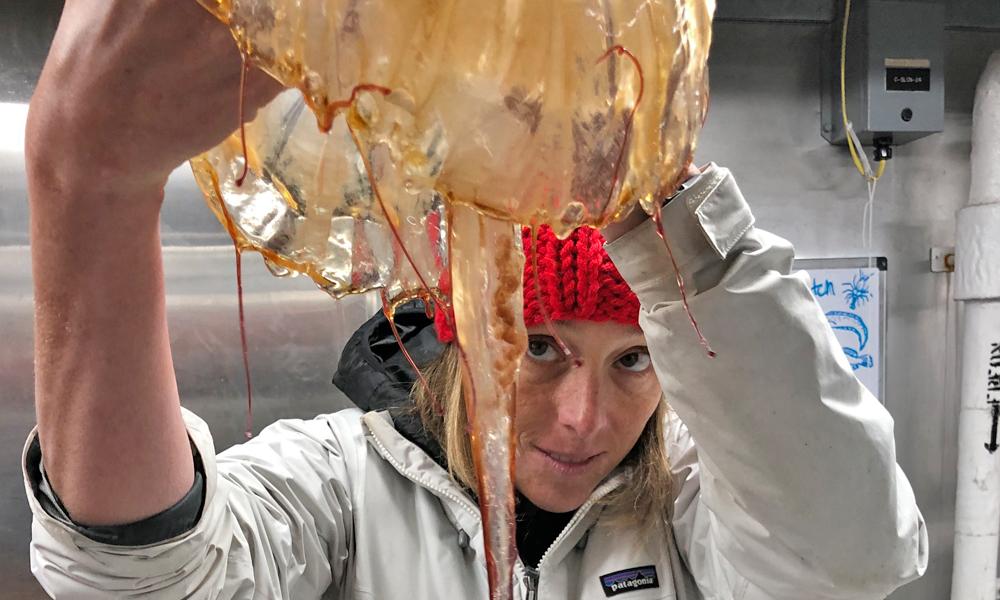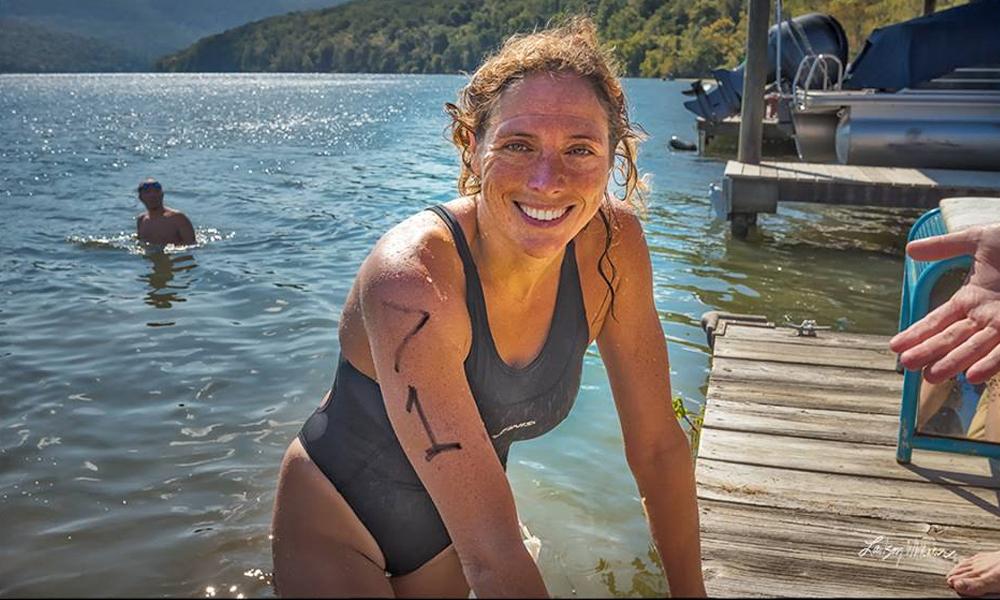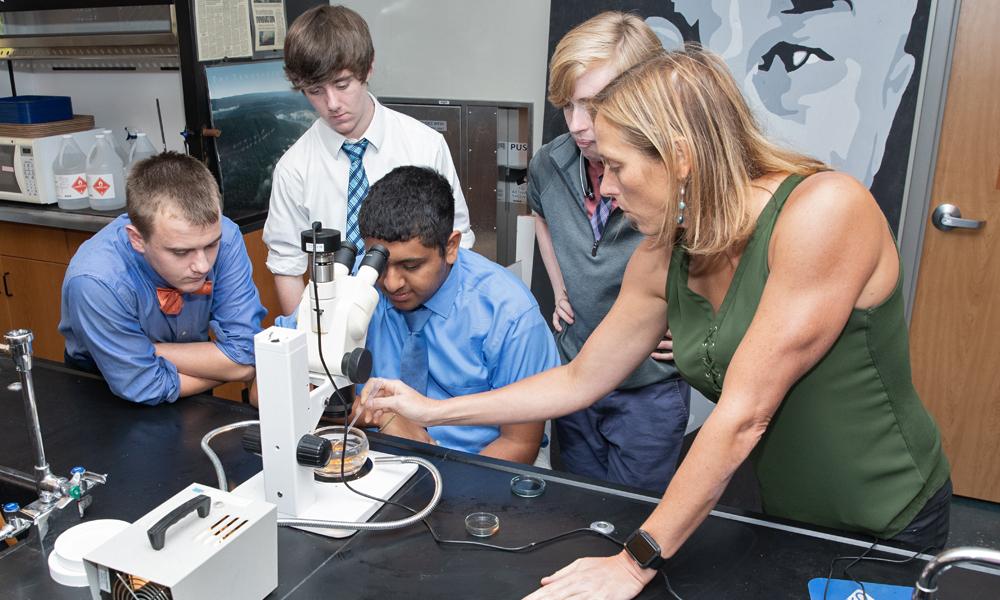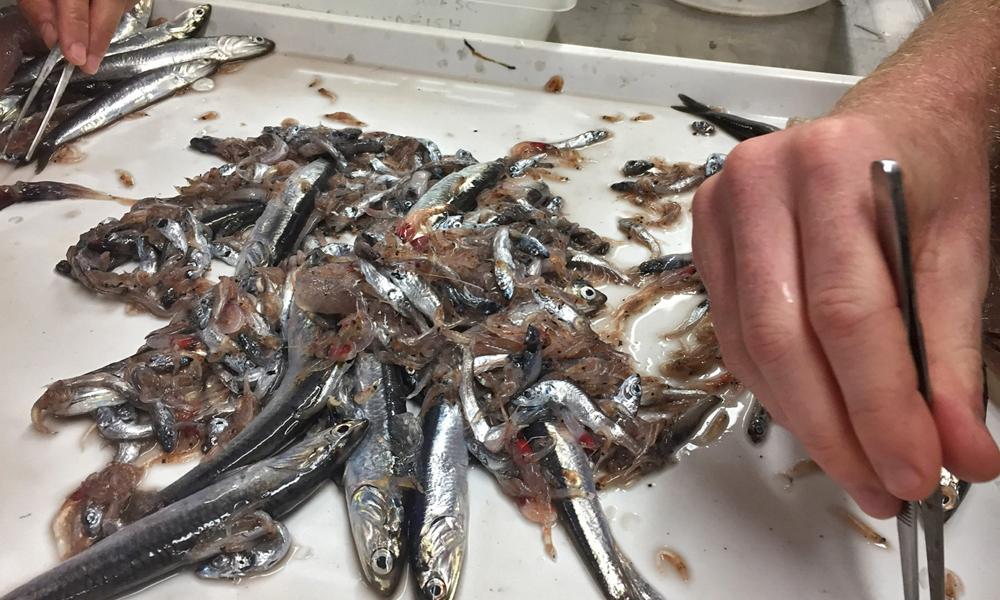Combining her loves
Karah Nazor (’99) draws from her Madison Experience every day
Education
SUMMARY: Karah Nazor (’99) shares her experiences as a teacher, scientist and open-water swimmer since graduating from JMU, where she majored in biology and swam for the Dukes.
Karah Nazor’s (’99) love of science, swimming and teaching intersected at JMU, where she majored in biology, minored in gerontology and swam for the Dukes as a student-athlete.
After earning a Ph.D. in gerontology at the University of Kentucky in 2005, she studied the molecular biology of prion disease (protein misfolding) at the University of California San Francisco. In 2008, she swam the English Channel, completing the approximately 21-mile solo swim from England to France in 12 hours and 28 minutes. Since 1875, just 1,638 people have completed the distance solo, according to the Channel Swimming Association.
Nazor teaches science research, general biology, marine biology, molecular biology and environmental science at McCallie High School in Chattanooga, Tennessee, her hometown. She remains an open-water swimmer and is race director of Swim the Suck, a 10-mile swim in the Tennessee River Gorge that annually attracts 100 swimmers from 35 states.
In summer 2019, the Pacific Ocean became Nazor’s lab when she embarked on a Teacher at Sea adventure through the National Oceanic and Atmospheric Administration.
Nazor recently shared her perspectives on science, swimming and JMU with Madison.
Madison: Marine biology and open-water swimming. There seems to be a connection.
Karah Nazor: I do love water. Swimming in the drink. When I was a kid, we always had a little round above-ground pool in my backyard. I joined a competitive swim team when I was 7. Sadly, the 50-meter pool has now become a Walmart. If it was not there when I was little, I would not have gotten to swim for JMU nor would I be the person who I am today. Like many children, I aspired to be a marine biologist because I love the water—rivers and oceans—and the organisms that live in them, from the diatoms to the humpbacks.
I love jellyfish because the Tennessee Aquarium in my hometown has one of the nation’s premier jellyfish exhibits, featuring more than 10 species. The aquarists there, including Thom Demas, Sharyl Crossley and Rachel Thayer, have trained me to raise jellies in culture. Over the last six years, we have collaborated on many research projects. Currently, I raise ctenophores, upside-down jellyfish and moon jellyfish in my lab, and my students’ hypothesis-driven research project topics range from growing primary cultures from stem cell-rich organs of the jellyfish to elucidating the effects of ocean acidification on marine invertebrates.
Madison: It’s an understatement to say that you challenge yourself. What is your philosophy?
Nazor: I came from a middle-class, hard-working family. My parents and teachers at the all-girls high-school I attended emphasized the message that hard work and determination will be noticed and will be beneficial in your life. People who choose to invest in you are concerned with your strength of character, not with superficial matters such as the size of your house or the car that you drive. I was fortunate to have many mentors at JMU and beyond who invested in me, who made me see my own potential and to embrace the idea that I deserve opportunities that are presented to me and to always challenge myself.
My philosophy is simple: If presented with a challenge, I feel confident in my ability to give my best effort and to structure my daily activities to be able to invest the energy toward achieving the goal. This perseverance can, and often does, lead to success. Endurance is a skill that I obtained early on as a swimmer who spent 20 hours training per week, either in the pool or in the weight room. Swimmers and all student-athletes learn to balance the time demanded by their sport early on. Such time management skills have proven efficacious in my adulthood.
Madison: Why did you swim the English Channel?
Nazor: I enjoy exploring the limits of my own physical and mental endurance. As with many endurance athletes, the motivation to train is enhanced if you have an event or race for which you are training. When I swim, I count my strokes in sets of three. One, two, three (breathe). When I swam the English Channel, I counted to three around 15,000 times in a row. Somewhere around the 7,000th time of counting to three, I entered a mental state where my mind was not occupied by any thought or emotion at all, and my body instinctively pulled me through the water, one stroke at a time, toward France. I am grateful for the privilege and the support of my family members, observers and pilot, who every half-hour fed me a little snack placed in a bucket on the end of a pole and gifted me their time to be able to have my day in the channel.

Madison: What do you love about teaching?
Nazor: My biology laboratory classes and professors at JMU, including Sharon Babcock and Jonathan Monroe, piqued my interests in biomedical research, in particular the neurodegenerative diseases of aging. After JMU, I worked “at the bench” for nine years, five in graduate school at UKY in the Telling Lab and four at UCSF for a postdoc in the Prusiner Lab. This means I was performing experiments in the lab, such as making transgenic mouse models, and testing the efficacy of drugs in cultured cells to elucidate the underlying mechanisms of prion diseases. So I am trained as a researcher, and am now teaching science.
I have the opportunity to work at McCallie, an all-boys college preparatory school. Two years ago, McCallie invested in the importance of science research education in high school and built Walker Hall, a state-of-the-art science building equipped with engineering, robotics and a tissue culture lab. I now enjoy the opportunity to work in a facility that can support in-depth research, such as having jellyfish tanks (plus 30 other tanks in my classroom/lab) and then being able to grow primary cultures from jellyfish in the cell culture lab.
I like to take my students outside to enjoy nature. I also love when my students hang around after the day has ended, just to talk, you know, about life.

Madison: A lot is expected of Teacher at Sea participants after their return. How have you met the requirements?
Nazor: I had the incredible opportunity to participate in the NOAA Teacher at Sea Program. Last May and June, I spent 10 days at sea aboard the ship Reuben Lasker as part of the Rockfish Recruitment and Ecosystem Assessment study, which is in its 30th year, led for its duration by Chief Scientist Keith Sakuma. I wrote a blog about my experience as a teacher at sea here: https://noaateacheratsea.blog/category/2019/karah-nazor/?utm_source=link&.
This type of professional enhancement is crucial for me as an educator, simply because I am better able to engage my students. I actually have my own stories to tell my students on this subject because I was there and participated in this research, I held these fish with my hands, and have photos and videos to show my students. When my students ask questions, I know the answer because I was there with the marine biologists! Heck, I was a marine biologist!
I am currently working on constructing a lesson that adheres to the National Science Teachers Association guidelines, promotes the research initiatives of NOAA and is fun for both teachers and students.

Madison: Did you enroll at JMU knowing that you wanted to major in biology?
Nazor: Yes, I did. I was attracted to the fact that JMU had a Division I swimming program and was an acclaimed university with a robust science department. I am inspired by the new science facilities and research labs available to the current JMU students. I learned that gerontology was a minor [during] the second part of my junior year at JMU and picked up those classes. This program embraced me as a biologist with an interest in older people. One professor in particular, Catherine Tompkins, took me under her wing and encouraged me to intern at the Association for Gerontology in Higher Education in D.C., and to apply to Ph.D. programs in gerontology. So, I took her advice and did both!
Madison: What drew you to JMU?
Nazor: As is the case today, JMU had been consistently ranked as having the best on-campus food in the nation. I was a hungry swimmer! Just kidding, the food was a fantastic bonus, but I was really attracted to JMU for the combination of excellent academic programs and the Division I swim program. The new rec center had just been constructed and I was excited about the outdoors programs, in particular the white-water kayaking in the area. The size of the school was also a good fit for me, with small class sizes.
Madison: Any favorite or especially influential faculty members/coaches at JMU?
Nazor: You better believe that I model my teaching and attitude after JMU’s Charles Ziegenfus, and I will pass on the fascination and passion for the gift of birds to my young students. [Editor’s Note: Ziegenfus is a professor emeritus of mathematics and statistics and an adjunct professor in the Department of Biology who teaches ornithology with a field component.] This brilliant, humble and kind professor is fully dedicated to students who either want to learn more about birds or share a passion about birds. Zig’s class is flagrantly the best class I have ever taken, and ever since I have been able to recognize common birds of North America that frequent lakes, rivers, forests and beaches. Sharon Babcock was my adviser in her first year at JMU. She was very kind and helpful and guided me in my course selection and career interests. My swim coaches were Leigh Ann Fetter-Witt and Gwynn Evans Harrison, in my senior year.

